Louth Circuit, Lincolnshire

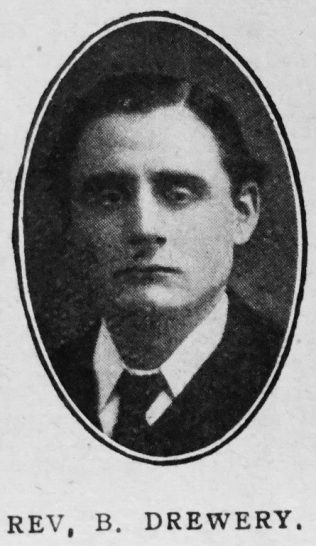
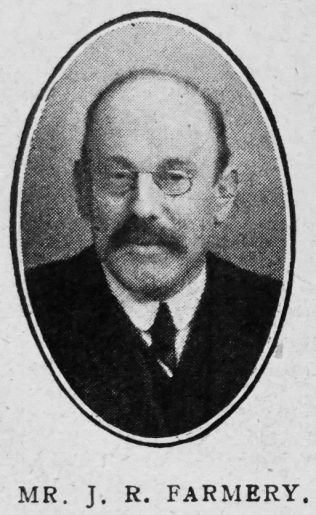
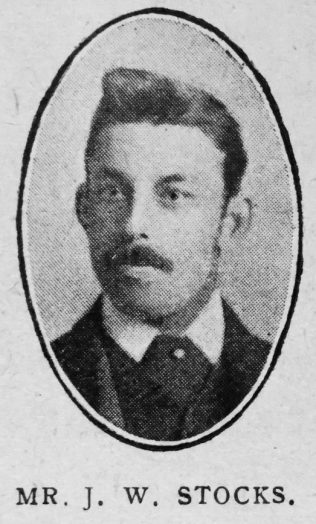
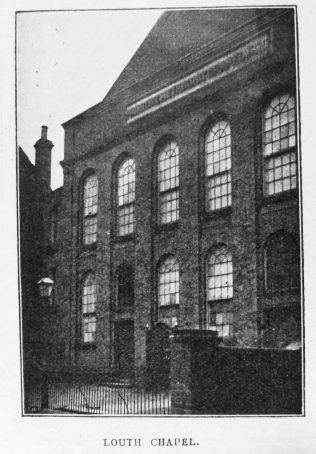
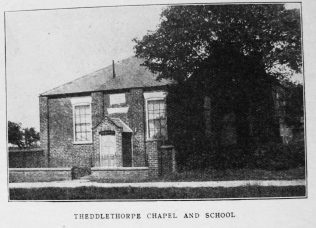
Transcription of Article in the Christian Messenger by Rev. P. W. B. Oliver
Louth, pleasantly situated at the foot of the Lincolnshire Wolds, and within easy hail of Tennyson Land, is the chief market town of a famous agricultural district, and possesses many features of interest. It boasts a wonderful old parish church, with spire of 288 feet, “one of the noblest in England”; and also an Edward VI. grammar school, where Tennyson was educated. The Sixteenth Century Rebellion, known as “The Pilgrimage of Grace,” had its origin in Louth; whilst the Methodist associations of town and district are many and interesting. In this town of 10,000 inhabitants, there are to-day three large Methodist churches, with seven resident ministers.
The Primitive Methodist Church in Northgate was built in 1850, and is a galleried building, with seating capacity for 750 people. It was erected during the ministry of the Rev. Hugh Campbell, and took the place of one built in 1836, under the superintendency of the Rev. John Coulson. At the opening of the earlier sanctuary, our fathers enjoyed what must surely have been almost a surfeit of oratory, as the preachers taking part in the services included William Clowes, John Flesher, William Harland and William Sanderson. These were tremendous times, and during the week-end our own chapel, Cannon Street Independent Chapel, the Guild Hall and the Market Place were occupied by our preachers. Mr. Coulson had as his colleague, at this time, the Rev. John Stamp, the brilliant and earnest evangelist, who made a deep and lasting impression on the generation which attended his fervent ministry; but who left behind him a legacy of mingled good and ill. The tragedy of Chapel building, which marred his work in Kent and ultimately led to his departure from the Connexion, might easily have had a parallel at Louth. Happily, the circuit rejoiced in the possession of two influential leaders, James Maltby and William Byron, who were amongst the most distinguished laymen of their time in Primitive Methodism. Mr. Maltby was for eight years General Missionary Treasurer, whilst Mr. Byron was for over forty years Circuit Steward. Thanks largely to their influence and support, the difficult situation was nobly faced, and Louth circuit was saved from a dreadful heritage of debt and disaster.
The years that followed were amongst the brightest in the history of the circuit. In 1836, John Coulson reported 130 members, with 20 on trial; by 1850 the membership had risen to 400; and from 1850 to 1860, the Rev. John Petty informs us the membership rose to 800. Many well known ministers served the circuit, and such names as those of Henry Woodcock (whose signature figures on circuit records as far back as 1849, and who is now the senior minister of our Church), Parkinson Milson, Joel Hodgson, Thomas Whittaker and others, all worthy of special mention, pass under review. Four superintendent ministers in succession came afterwards to high Connexional rank, viz., Charles Kendall, Thomas Whitehead, Robinson Cheeseman and Joseph Wood. Three of these became Presidents of Conference. Quite a number of the sons of the circuit entered the ministry of our Church about this period, amongst them Thomas Hobson, William and Charles Spivey, George Pinder, and Thomas Waumsley, all from Louth. John P. Osborne went out from Grainthorpe, whilst the village of Theddlethorpe made a remarkable contribution with the gift of the following to the ministry of the Connexion:- William Paddison, John F. Parrish, Daniel Moore, Jabez Wood and Henry Oliver (father of the present Superintendent Minister). To Louth, apparently, belongs the honour of possessing the first Primitive Methodist Ladies’ Missionary Auxiliary. The Large Magazine for 1846 contains a lengthy account of the activities of the Louth Ladies’ Missionary Sewing Committee, and in a special note, the Editor commends the example of Louth to the women of the Connexion. The Missionary Breakfast in the Town Hall is no longer a leading function of the circuit’s year, and the Missionary Basket goes the round of the villages no more; but the circuit still does well for missions, and there are some splendid collectors in town and village rendering fine service to the cause.
Time would fail to tell of all the stalwarts who have contributed worthily to the best life of the circuit. The names of Messrs. J. Allison, James Cooke of Luelborough, and Councillor Richard Simpson, who held the office of Circuit Steward for many years in turn, will long be remembered as representing length and consistency of valued service. Mr. Simpson was followed by Mr. W. Swaby, who at an advanced: age is still spared to the circuit. Later, the office was held by Mr. R. Hewitt, of Legbourne, recently passed away. Mr. Hewitt was a born preacher, a man of striking personality and great gifts, yet withal modest to a degree. The present steward, Mr. J.R. Farmery, is a man of many parts. A trained journalist and editor of the Louth Observer, writer not unknown to readers of the P.M. Leader and Holborn Review, he is also a keen student and an able local preacher. Mr. Farmery is in the prime of life, and his deep interest in the welfare of the circuit gives good ground for hope that his term of office may be a lengthy one. The recently elected Junior Steward is Mr. J.W. Stocks, of Ludborough, grandson of the late James Cooke, and a loyal Primitive Methodist of the third generation at least. Messrs. W. Swaby, J.W. Houseman, G. Smith and W. Drury are honoured local preachers whose names have figured on the Louth plans for more than fifty years.
Louth Circuit, through the trying period of the past thirty years, has scarcely realised the glory of its former days. The decaying countryside, the depopulation of rural England, the general change in the habits of the people, which has resulted in this country becoming the home of an urban, more than of a rural, population – all this has left its inevitable mark on such a circuit as Louth. But the story of this circuit is not all ancient history; its prospects are very bright indeed, and the minister who, during three months, has attended no less than ten Reception meetings and some record Harvest Festivals, cannot fail to be impressed with the fine possibilities in evidence in the town and circuit. Under the able superintendency of the Rev. W. Mainprize, whose term of service covered the whole period of the war, debts have been materially reduced on Trust property and ministers’ houses; so that the churches having risen to their opportunities are now able to face heavy circuit liabilities most gallantly. Now that the war is over and we can rejoice in the return of several of our young men, who are prepared to give themselves to loyal Christian service, there is hope in the circuit that “the best is yet to be.” We have in Louth a strong church of 160 members. The Services are well attended, and the congregation, on Sunday evening – most encouraging from the number of young people present – is one of the largest in Lincolnshire Primitive Methodism. The Young Life Campaign is being well worked, and good results are anticipated. There is a flourishing C.E. Society, of which the Rev. B. Drewery is the deservedly popular president. The Sunday School is healthy and progressive; the graded system is about to bed introduced and Young People’s Week Night activities both for girls and boys are coming within the scope of its organisation. The Church rejoices in many fine workers in all its branches. The Senior Society Steward is Mr. E. Lane, who has a long record of service in the Louth and Scotter circuits, and is a well-known District Official. At Legbourne, about three miles from Louth, we have a beautiful modern church, with convenient school premises. Good congregations gather at all the services, and not least on Sunday mornings. There are some splendid church workers here, and the leadership has always been of a high order. The late Mr. R. Hewitt has left a deep impression on the life of the village and circuit. The name of Graves, long and honourably associated with the Legbourne Society, is still worthily represented in important offices of the church.
Theddlethorpe is a large coast village in “the marshes,” twelve miles distant from Louth and about two miles from Mablethorpe. It comprises two parishes, Theddlethorpe St, Helens being our sphere, whilst the Wesleyans serve Theddlethorpe All Saints. The present chapel was built in 1852, and the schoolroom in 1888. Theddlethorpe has always stood well amongst the country places in Louth circuit. The names of Parrish and Allison are still in evidence in connection with our Society here, of which Mr. G. Tyson, whose association with Theddlethorpe Primitive Methodism is life-long, has been for many years Steward. The young life of this church is also full of promise.
North Somercotes is another large “marsh” village, where we have a vigorous society. There is a fine Sunday evening congregation, a strong membership, and every opportunity for progress. The late Mr. T. Laughton, who recently passed away at a ripe old age, was for many years Society Steward. It is worthy of placing on record that, when times were hard and hospitality a serious matter, he added two rooms to his cottage and built a stable, so that he might entertain the preachers and provide accommodation for their horses. Mr. J. Jacklin, another worthy veteran, still takes a live interest in the activities of the Church. Somercotes, under its present able and devoted leadership, gives every promise of maintained prosperity.
Ludborough has a flourishing society, which has always provided the circuit with good workers and generous supporters. The names of Cooke and Stocks have stood for conspicuous loyalty and devoted service for well over sixty years. For quite that length of time these names have been associated with the stewardship of the society, and now for a second toime with stewardship of the circuit.
Saltfleetby, in “the marsh,” is a scattered village of three parishes, where we have a beautiful little chapel and good school premises. Saltfleetby boasts our one lady society steward in the person of Mrs. J.E. Reed, who has worthily filled the office for several years and also our one lady local preacher, Miss Fletcher, well known to a much wider constituency than that of the Louth circuit.
Grainthorpe is a village of some 660 inhabitants, where there are three Methodist chapels. Our people now combine their services with those of the United Methodists; for which the plan makers, at least, have good reason to be grateful. Mrs. W. Smith, Mrs. G. Janney and Mr. G. Willerton are veteran workers at Grainthorpe, and there are loyal helpers of the younger generation.
At Withcall a village consisting of one farm, and that the largest in England, we have been unable to secure a site of land for a chapel, and have worshipped, for over sixty years, in a cottage. Mr. J. Portas, the present steward, has been for long years a stalwart at Withcall, and for over thirty years class leader.
Alvingham, about four miles from Louth, has served Sir Robert Perks as an object lesson to illustrate the need of Methodist Union. The Sunday Schools are already one, and when the minister visits Alvingham on a Sunday afternoon he has united Methodism in the congregation. The name of Naylor will long be remembered here, and that of Hand is still well represented in the active life of the Church. Alvingham, Cockerington, Grimoldy and Fotherby are small villages all blessed with three Methodist chapels. We have good, loyal workers in each of these villages, but we have certainly here glaring instances of the waste of divided Methodism.
In the villages of the Circuit are homes whose generous hospitality will be gratefully remembered by all ministers who have travelled at Louth.
Louth Circuit Primitive Methodism has great traditions, which it is not unworthily maintaining. Whatever the future of Methodism, our church will make no mean contribution to the best life of that future in this corner of the great Methodist county which gave John Wesley to the World.
References
Christian Messenger 1920/144





Comments about this page
I presume the Mr J Portas referred to above is one and the same as who married the daughter of the Rev John Redhead. I am the great grandson of the latter and currently trying to make sense of the family papers that I have inherited.
I met John Portas and his wife, or Aunt Peggy as I was allowed to call her, a few times. I have an abiding memory of going to see them in their later years. Aunt Peggy smoked cheroots!!! On the wall was a wonderful photo on Uncle John standing beside the engine he used to drive. Sadly that photo is not amongst the family papers! I remember Uncle John as a very gentle man whereas Aunt Peggy was a feisty lady with a twinkle in her eye.
I would dearly love to make contact with Geoff Dickinson, Jill Barber and the gentleman researching Elmfield College (which at least one of Aunt Peggy’s brothers attended) to exchange Redhead family history.
Add a comment about this page